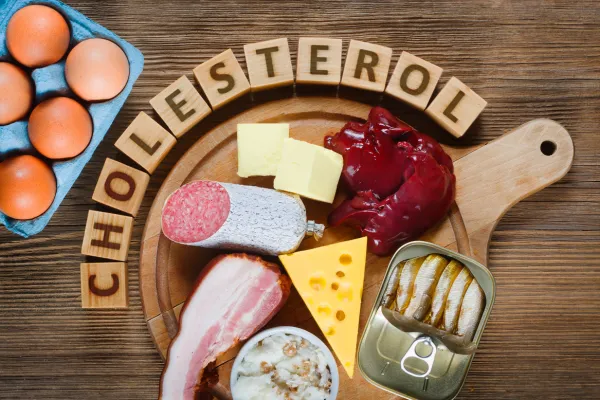
Cholesterol Demystified The Good The Bad and How to Take Control
Managing cholesterol is pivotal for maintaining a healthy heart. Despite its reputation, cholesterol isn’t all bad. Understanding the differences between LDL (bad cholesterol), HDL (good cholesterol), and triglycerides is essential to decode your health report and take actionable steps to reduce your risks.
This comprehensive guide explores the different types of cholesterol, their roles, health implications, and how to manage them effectively through diet and lifestyle.
What is Cholesterol?
Cholesterol is a waxy, fat-like substance naturally produced by your liver and also found in certain foods. It’s essential for building cells and producing hormones, yet having abnormal cholesterol levels can pose significant health risks.
The Types of Cholesterol
LDL (Low-Density Lipoprotein): Known as bad cholesterol, it contributes to plaque formation in arteries, restricting blood flow and increasing the risk of heart attack or stroke.
HDL (High-Density Lipoprotein): The good cholesterol that helps remove excess LDL from the bloodstream and protects against cardiovascular problems.
Triglycerides: A type of fat in your blood, which, when elevated, can boost the risk of cardiovascular disease, particularly when combined with high LDL or low HDL.

Understanding Cholesterol Numbers
Healthy cholesterol levels vary by type. Here’s a quick breakdown of what to aim for, according to the CDC:
Total Cholesterol: Less than 200 mg/dL is ideal.
LDL: Keep it below 100 mg/dL.
HDL: Aim for 60 mg/dL or higher.
Triglycerides: Under 150 mg/dL is considered normal.
Monitoring these numbers is key to staying on top of your cardiovascular health.
Why High Cholesterol is Dangerous
When cholesterol levels, particularly LDL, rise too high, it can lead to atherosclerosis – the buildup of plaque in artery walls. This condition narrows arteries and can result in life-threatening conditions such as:
Heart Attack due to restricted blood flow to the heart.
Stroke caused by blocked blood flow to the brain.
Peripheral Artery Disease (PAD) affecting extremities like legs and arms.
Chronic Kidney Disease, as poor blood flow impacts kidney function.
Tips for Managing Cholesterol Naturally
The good news? High cholesterol is manageable, and even small changes can yield significant results.

1. Follow a Heart-Healthy Diet
Increase Fiber Intake: Foods like oatmeal, lentils, beans, and fruits like apples or oranges help reduce LDL levels.
Add Healthy Fats: Incorporate avocados, nuts, seeds, and oils like olive or canola into your diet.
Cut Back on Saturated and Trans Fats: Avoid processed snacks and red meats. Replace them with lean protein sources like fish and tofu.
2. Get Moving
Exercise is one of the most effective ways to improve cholesterol levels and overall heart health. Aim for at least 150 minutes of exercise per week. Activities like walking, cycling, swimming, or even yoga can help increase HDL and lower LDL.
3. Quit Smoking
If you smoke, now’s the time to quit. Smoking damages blood vessels and lowers HDL, making cholesterol-related risks even higher. Stopping smoking has almost immediate benefits for cardiovascular health.
4. Keep Alcohol in Check
Drinking moderately may improve HDL but overconsumption increases triglycerides and raises blood pressure. Stick to one drink per day for women and two for men (and less is always better).

5. Manage Stress
Stress isn’t often linked directly to cholesterol but can lead to unhealthy lifestyle choices that raise LDL. Yoga, meditation, deep breathing, or simply going for regular walks can make a huge difference.
6. Regular Cholesterol Checks
Knowing and tracking your numbers, ideally through annual tests, ensures you can address problems early and make informed dietary or medication changes.
Medical Options for Cholesterol Management
Sometimes, lifestyle changes need a little extra help. Common medications include:
Statins: Widely prescribed, they block a substance your liver uses to make cholesterol.
Bile Acid Sequestrants: Help remove cholesterol via digestion.
PCSK9 inhibitors: A newer option that dramatically lowers LDL levels.
Ezetimibe: Targets and reduces cholesterol absorption through your intestines.
Talk to your healthcare provider to find out what might work best for your condition and individual needs.
How Premier Cardiology of Vero Beach Can Help
At Premier Cardiology of Vero Beach, we specialize in personalized cholesterol management plans. Our approach includes both lifestyle interventions and advanced medical treatments designed to keep your heart healthy and reduce your risks for severe cardiovascular problems.
Here’s what we offer:
Advanced lipid testing for tailored cholesterol assessments.
Lifestyle coaching with heart-friendly dietary and fitness plans.
Medication management and monitoring, including cutting-edge treatments.
Concierge and non-concierge care options designed to suit your lifestyle.
Take Control of Your Cholesterol Today
High cholesterol levels may not always show immediate symptoms, but they’re a ticking time bomb for your heart and overall health. The key is to take charge early and consistently by making healthier choices, tracking key numbers regularly, and working with trusted professionals.
At Premier Cardiology of Vero Beach, we’re here to guide you every step of the way. Whether you need advanced screening, personalized advice, or ongoing care, Dr. Vik Gogidi and his team can provide the expertise and support you need.
📞 Call us at (772) 494-0794
🌐 Visit www.premiercardiologyvb.com
Start your heart health journey today. Your best self is just one step away.

Dr. Vik Gongidi
